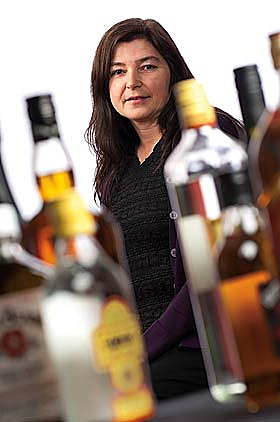The association of alcohol consumption with various forms of cancer risk is not new. According to the U.S. National Cancer Institute, the National Toxicology Program of the U.S. Department of Health and Human Services lists consumption of alcoholic drinks as a known human carcinogen.
Citing research, the NCI says clear patterns have emerged between drinking alcohol and the development of several types of head and neck cancer, particularly the pharynx (throat) and larynx; liver cancer; breast cancer; and colorectal cancer.
Breastcancer.org says research consistently shows that drinking increases a woman’s risk of developing hormone-receptor-positive breast cancer, noting that alcohol can increase the levels of estrogen and other hormones associated with that type of cancer, and may also increase breast cancer risk by damaging cell DNA. Compared to women who abstain, those consuming three alcoholic drinks per week have a 15% greater risk of developing breast cancer.
The UK independent charity Drinkaware cites its chief medical advisor, Paul Wallace, as noting that alcohol is one of several factors that can increase breast cancer risk. And, according to a 2010 study published in the British Journal of Cancer, about 6% of breast cancer cases in the UK are linked to alcohol consumption.
A new study published in the journal Addiction further bolsters evidence. The paper, “Alcohol consumption as a cause of cancer,” was written by its lead researcher, Jennie Connor, chair in the Department of Preventive and Social Medicine at the University of Otago in New Zealand. 
“There is strong evidence that alcohol causes cancer at seven sites in the body and probably others,” Connor wrote.
She noted that evidence of a causal role of alcohol in cancer development continues to emerge, but the news is frequently accompanied by unclear and conflicting messages in the media. Particular confusion among journalists, and even health professionals, exists when translating the “alcohol causes cancer” concept: both in the meaning of “cause” and the quality of evidence. Connor acknowledged that while a degree of confusion and scepticism about alcohol as “cause” is understandable, in some instances such doubts are also “being generated by dissemination of misinformation, which undermines research findings and contradicts evidence-based public health messages.”
Consequently, Connor affirmed that the new study aimed to clarify the strength of evidence identifying alcohol as a cause of cancer, and of the meaning of “cause” in that particular context.
The study reviewed and summarized recent epidemiological and biological research associating alcohol with cancer. Research was drawn from published meta-analyses identified from the Medline database and archives of the International Agency for Research on Cancer, the American Institute for Cancer Research, and the International Agency for Research on Cancer. Other more recent epidemiological studies not included in these publications were also reviewed.
Connor said that the usual epidemiological understanding of a “cause” would refer to a factor that increases incidence of a particular condition or disorder in the population.

Connor maintains that even without complete knowledge of all of the biological mechanisms in play, “the epidemiological evidence can support the judgement that alcohol causes cancer of the oropharynx, larynx, oesophagus, liver, colon, rectum and breast,” that “current estimates suggest that alcohol-attributable cancers at these sites make up 5.8% of all cancer deaths world-wide.” Confirmation of specific biological mechanisms explaining which variety of alcohol increases incidence of each type of cancer, respectively, is not required in order to infer that alcohol is a cause of cancer, she said.
She projects that ongoing research will shed light on mechanisms underlying the relationship of alcohol consumption and cancer more clearly, and increase confidence in the epidemiology.
For all of the seven cancer variants cited, a dose-response relationship was identified. The increase of cancer risk grows with increased average alcohol consumption — although there is no evidence of any threshold of effect, or variation with beverage type. Recent analyses from two large cohort studies in the U.S. do not suggest a significant impact of drinking pattern on risk of total cancer in light to moderate drinkers. Further supporting a causal association, some evidence suggests that risk for laryngeal, pharyngeal and liver cancers is reversed when alcohol consumption ceases.
The report also contends that accumulated research indicates that causal drinking also plays a role in the development of cancer in the pancreas, prostate and skin (melanoma), with pancreatic cancer risk in particular being associated with both heavy drinking and average consumption.

